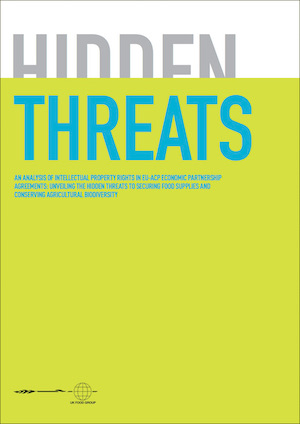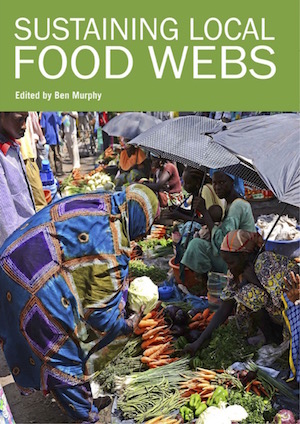 Sustaining local food webs
Sustaining local food webs
Ben Murphy ed for the europAfrica project and UK Food Group, published by Practical Action, 2014
Local food webs are productive, resilient and healthy, connecting food providers and consumers locally. These food webs are efficient in terms of food provision when compared with the long chains that deliver the commodities produced by industrial agriculture to distant consumers, and they need protection, increased investment and support. This report has case studies from Cameroon, Kenya, Mali, the UK and Hungary.
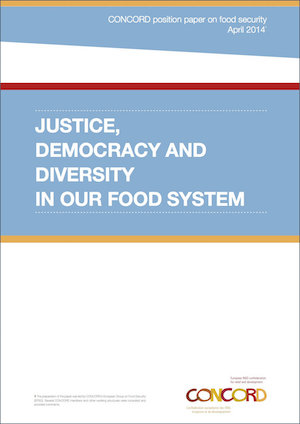 Justice, democracy and diversity in our food system
Justice, democracy and diversity in our food system
CONCORD, 2014
Hunger in our world today is a result of injustice not of scarcity. Position paper of the CONCORD network on food security, setting out a vision of a food system that enables everyone to eat a healthy, nutritious diet that is based in the right to food, shaped by planetary boundaries, resilient and defined by people. Calls for participatory and democratic governance of our food system, agroecological methods of production, prioritising local economies and trade, responsible investment and measures to stabilise markets, rights to productive resources, responsible consumption, research and innovation that meets the needs of small-scale producers, and better aid and development policies.
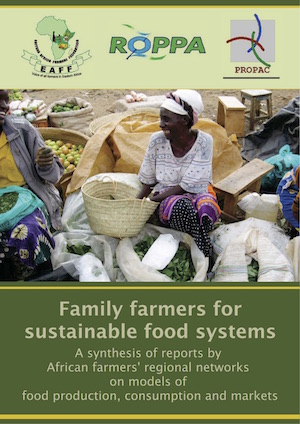 Family farmers for sustainable food systems:
Family farmers for sustainable food systems:
a synthesis of reports by African farmers regional networks on models of food production, consumption and markets
EAFF, ROPPA and PROPAC, published by the europAfrica project, 2013
english | français
Family farming is the basis for modern food provision in Africa, today and tomorrow. Investing in family farming and small-scale food production will improve food provision, social and environmental sustainability and safeguard livelihoods for the majority. Guaranteeing rights of access to and control over productive resources- land, water, agricultural biodiversity – is essential to support family farming and small-scale food production and resilient food systems. Strengthening and building agricultural and food markets, which are within the control of family farmers and small-scale food producers, support socially and environmentally sustainable production, and provide accessible quality food for consumers, is essential.
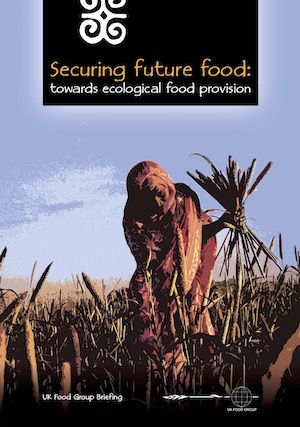 Securing future food: towards ecological food provision
Securing future food: towards ecological food provision
UK Food Group, 2010
We need to make a radical shift towards ecological food provision in order to secure future food for the world’s predicted 9 billion people. The systems that currently feed most people in the world are smaller-scale and locally-sourced. They can be enhanced through practices based on agroecology to meet current and future global demands for food. Research and trade policies and agricultural support measures urgently need to be reoriented in this direction.
Hidden threats: an analysis of intellectual property rights in EU-ACP economic partnership agreements
Andrew Mushita for UK Food Group, 2009
The EU sought to include new rules on Intellectual Property Rights (IPRs) in already controversial and resisted Economic Partnership Agreements (EPAs). This is highly contentious because of the potential impacts on securing food supplies and conserving agricultural biodiversity. The European Union is demanding from African, Caribbean and Pacific countries (ACP) new intellectual property standards beyond those already incorporated in the WorldTrade Organization (WTO) Agreement on Trade Related aspects of Intellectual Property Rights (TRIPS).
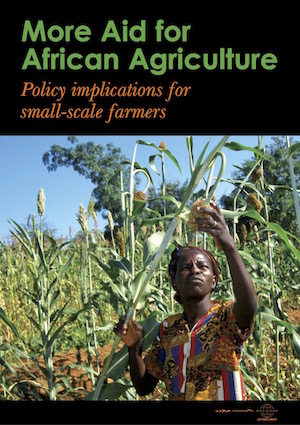 More aid for African agriculture: policy implications for small-scale farmers
More aid for African agriculture: policy implications for small-scale farmers
UK Food Group, 2008
policy report
evidence document
annexes:
annexes 1-10
annexes 11-20
annexes 21-30
annexes 31-40
annexes 41-50
annexes 51-67
As agriculture returned to the policy spotlight in 2008 following the food price shock, many donors reviewed their priorities on food and agriculture issues. The UK Food Group summarised the policies of major donors, which cluster around five main themes: aid effectiveness, market & private sector led agricultural growth, exiting agriculture, improved governance & political processes, and African ownership. Calls for the new agriculture agenda to give priority to approaches that would be sustainable, can be locally controlled and would realise the Right to Food and food sovereignty.
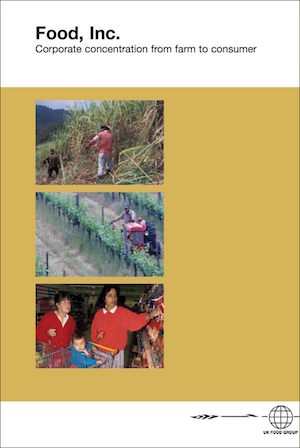 Food Inc: corporate concentration from farm to consumer
Food Inc: corporate concentration from farm to consumer
Bill Vorley for UK Food Group, 2003
Supply chains are developing in such a way that a large number of competitive and relatively powerless suppliers face a few large buyers. Farmers are playing to the rules of perfect competition while their customers are part of a complex monopoly. The savings that food processors and retailers accrue from paying suppliers below competitive levels are often passed on to consumers to gain market share. Growth of supermarkets and the ‘modernisation’ of the retail sector can have profound impacts on the structure of domestic agriculture and food processing, and these patterns are moving into mid- and low income countries.
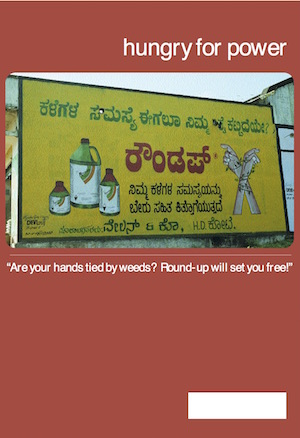 Hungry for power: the impact of transnational corporations on food security.
Hungry for power: the impact of transnational corporations on food security.
UK Food Group, 1999.
Details the impact of food and agricultural transnationals on food security. Between them, the food and agribusiness corporations have huge control over every part of the food chain, from land to seeds, crops to chemicals, processing to marketing. Spotlights the activities of Nestlé, Cargill, Monsanto, Chiquita, Zeneca, British American Tobacco. Food security is too important to be left in the control of transnational corporations. The international community must take action to curb the power of transnational corporations where their activities threaten food security.
Briefings and policy submissions
UK Food Group submission to the International Development Committee of Parliament on ‘Global food security’. December 2012.
UK Food Group submission to the UK Dept of Business, Innovation & Skills (BIS) on ‘Shaping a UK strategy for agri-tech’. November 2012
UK Food Group submission to the APPG Food and Agriculture for Development inquiry on ‘Meeting the Millennium Development Goals’. November 2010
Contribution from the European Food Security Group (EFSG) of CONCORD to the consultation on the Issues Paper “Towards an EU policy framework to assist developing countries addressing agriculture and food security challenges”. January 2010.
UK Food Group submission to the consultation on the White Paper “Securing our common future”. May 2009.
The food price crisis: what needs to be done. European Food Security Group of CONCORD. October 2008.
Advancing African Agriculture: the impact of European policies and practices on African agriculture. Monitoring exercise by European Civil Society Organizations, October 2008
UK Food Group submission to the International Development Committee of Parliament on ‘The World Food Programme and global food security’. April 2008.
CAP’s impact on productive structures and family-based agriculture in Europe. UK Food Group case study for the EuropAfrica project. 2006
UK Food Group submission to the DFID White Paper consultation ‘Eliminating World Poverty’. April 2006.
Achieving fairness in trading between supermarkets and their agrifood supply chains. UK Food Group briefing, September 2005, Anne Tallontire and Bill Vorley
Comments from the UK Food Group on DFID’s draft agriculture policy paper “Productivity growth for poverty reduction: an approach to agriculture”. September 2005.
Dialogue on agricultural trade reform, subsidies and the future of small and family farms and farmers. Tom Lines for Sustain and UK Food Group. April 2004. Including submissions from CIIR, Christian Aid, Family Farmers Association, Farm Crisis Network, Farmers Link and IATP.
The CAP doesn’t fit. Sustain and UK Food Group briefing, 2002.
The Common Agricultural Policy: how the CAP operates, the key commodities, competitors and markets for the European Union. Background briefing 1. Sustain and UK Food Group, 2002.
The Common Agricultural Policy: options for reform and their potential impact. Background briefing 2. Sustain and UK Food Group, 2002.

